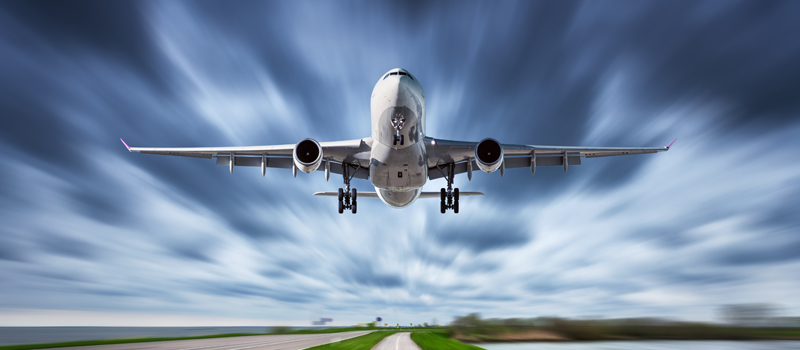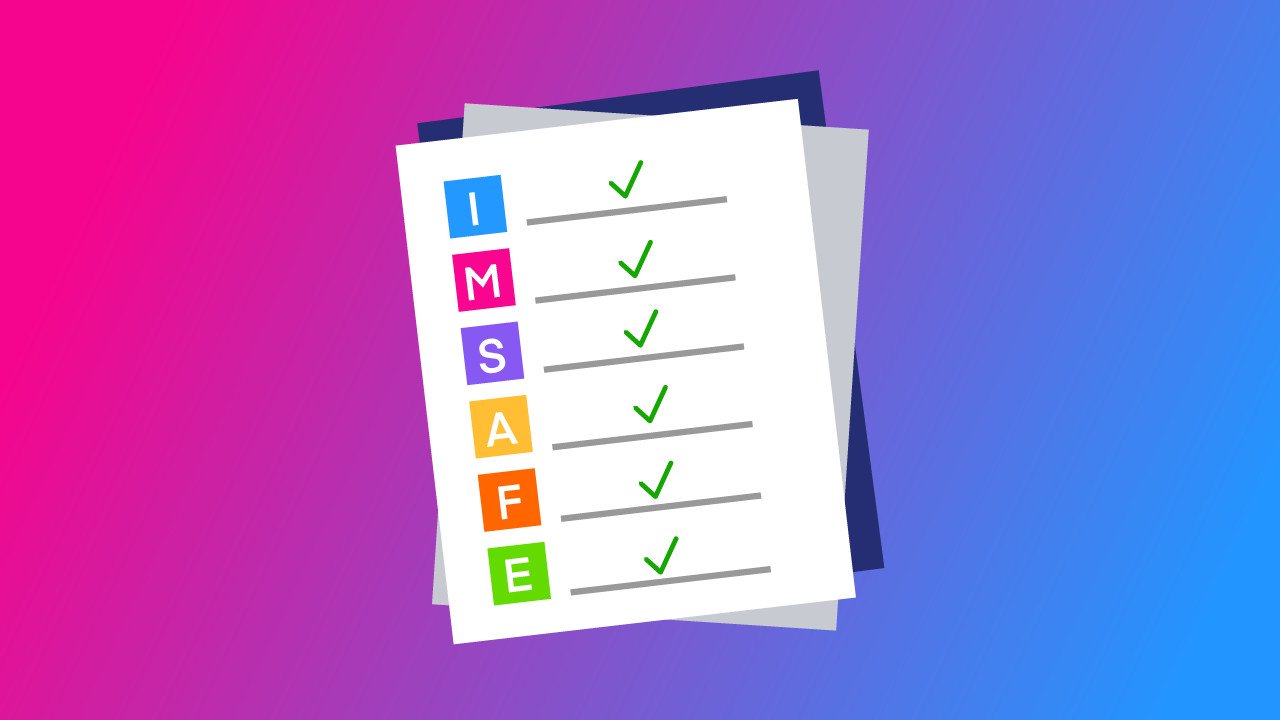Have you ever heard of an Aircraft Dispatcher? They have an important job ensuring your flight goes smoothly from takeoff to landing. This career is important to aviation and pays a great salary!
But what exactly does an aircraft dispatcher do? What sort of training or certifications are required to become one? And what are the requirements for getting the job?
Don’t worry—we will provide you with all the information you need to decide if being an Aircraft Dispatcher is the right job for you!
Key Takeaways
- Dispatchers are often called pilots on the ground. They plan and monitor flights to ensure they are operated safely and efficiently.
- The salary at major carriers starts at $60,000 and can increase to upwards of $175,000.
- Dispatchers must be licensed, which requires training, exams, and an initial investment of around $3,000-$8,000 in school.
- You can become a certified Aircraft Dispatcher through an FAA-Approved 14 CFR Part 65 training program.
What Does a Dispatcher Do?
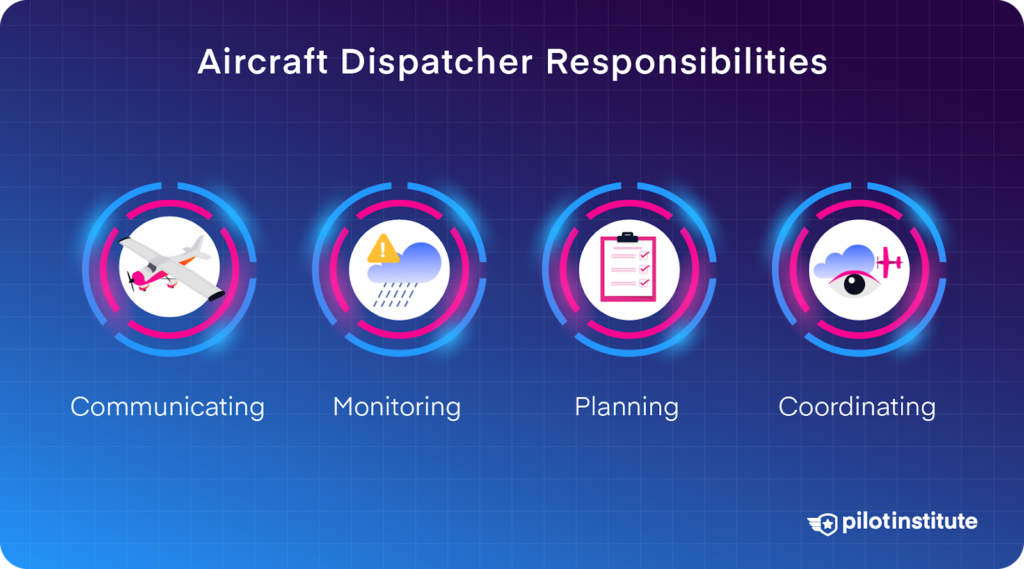
Dispatchers are often considered “pilots on the ground” and play an important part in airlines. In smaller operations, the pilots plan the entire flight. In an airline environment, pilots have many responsibilities. They often are too busy to plan a commercial flight from start to finish.
As a result, larger operations often rely on dispatchers specializing in flight planning to handle the responsibility. Flight dispatchers also communicate with pilots and update them about weather, turbulence, and other variables that could affect their flight. They also plan diversions and give pilots feedback during emergencies.
As a dispatcher, you are responsible for organizing all ground activities at an airport for the flights you oversee. Essentially, your job is to ensure aircraft come and go safely and quickly.
Responsibilities of an Aircraft Dispatcher
An aircraft dispatcher has a host of responsibilities to handle. These include but are not limited to the following.
Planning
As a dispatcher, your main job is to plan flights from start to finish. You’ll then pass this information on to the pilot so they have all the information they need to conduct the flight safely.
Your shift will begin with you gathering the current and forecasted weather for the day. The weather is used to plan the route, calculate the cruising altitude, and more.
You will then have to focus on the aircraft’s navigation equipment. Does it have GPS, INS, or VOR systems? Depending on the navigation equipment, you’ll plan the flight’s route. You must know about airspace restrictions, bad weather, and other considerations. So, taking information from multiple sources, such as NOTAMs and SIGMETs, is important.
Once the route and cruising altitude have been decided, the dispatcher will focus on the aircraft’s payload, including the passengers’ weight, luggage, and cargo. You will then focus on fuel requirements. Too much fuel might cause the aircraft to be overweight, and too little will prevent it from reaching its destination.
Depending on certain variables, you may need to reduce weight to ensure good performance. You must also manage where to load specific cargo to maintain the center of gravity limitations.
Once all this is done, you will file the flight plan. This includes producing all the paperwork the crew requires for the flight, including weather reports, passenger lists, and cargo manifests.
Monitoring, Communicating, and Scheduling
A dispatcher has a bird’s-eye view of the airline’s operations and must track any changes during their shift. This includes weather and other variables that can affect the flight plan. For example, turbulence could result in a simple flight level change or require a new route.
Additionally, you must monitor the aircraft’s status in the air and on the ground in case of technical difficulties. If an aircraft suffers a failure and cannot continue, you’ll have to look for a replacement. This involves communicating with flight and cabin crews, maintenance, and operations to ensure everything goes smoothly.
Dispatchers are in charge of tracking aircraft arrivals and departures. They must also amend the flight schedule in the event of delays. If a flight is canceled, the dispatcher must find a replacement aircraft and crew to take over and complete the flight.
Requirements To Become an Aircraft Dispatcher
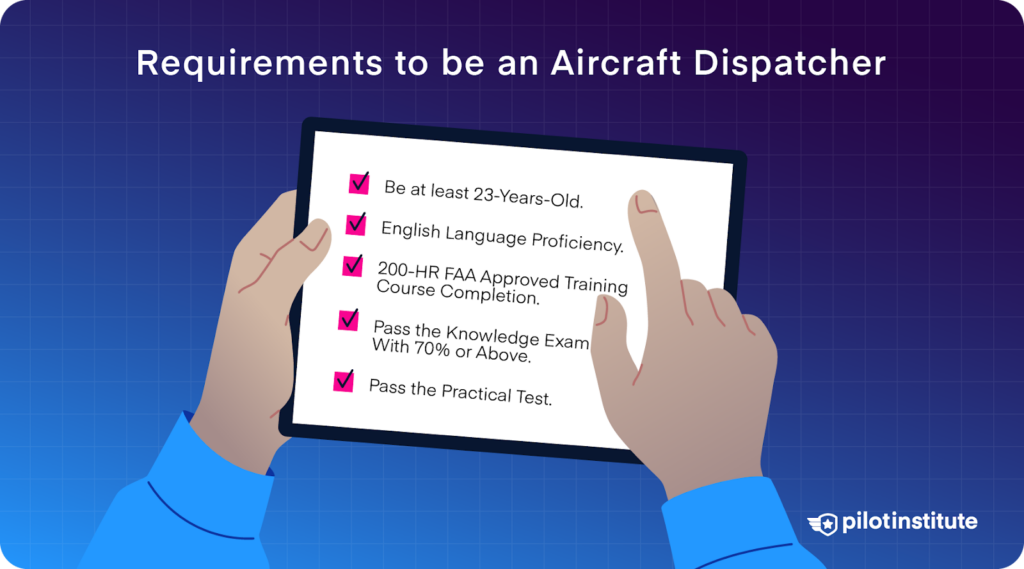
Like many skilled positions in the aviation industry, candidates must meet a list of requirements to become a flight dispatcher. These are outlined in the Federal Aviation Regulations (FAR) Part 65.
To act as an aircraft dispatcher, the following requirements must be met:
- You must be at least 23 years of age to begin working.
- You must have a high school diploma or equivalent qualification.
- You must be able to speak, read, write, and understand English adequately.
- You must undergo an FAA-approved training program and accumulate 200 hours of training (roughly four to six months).
- You must pass the FAA Aircraft Dispatcher Knowledge (70% score or higher) and Practical Tests.
You can start an aircraft dispatcher training program if you meet the first three criteria. It is important to find a reputable and FAA-approved course for your training. There are plenty of schools, universities, and training programs that you can enroll in.
Some of the more recognized providers include:
- Jeppesen Academy (Denver)
- Embry Riddle Aeronautical University (Arizona and Florida)
- Delta Dispatch Academy (Georgia)
- Academy College (Minnesota)
- Community College of Baltimore County (Maryland)
The FAA has a comprehensive list of approved training providers as of 2023. Earning your dispatcher’s license takes around six weeks and roughly $6,000.
Details About the Job
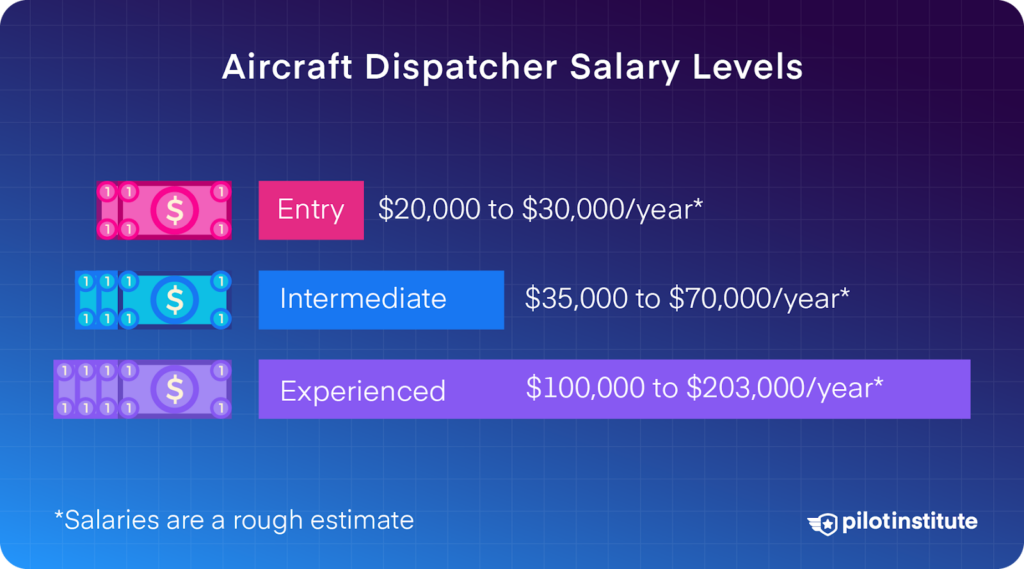
The salary for an aircraft dispatcher varies based on whether they work for a private charter, a regional airline, or a mainline carrier. It also depends on where they are based and the level of seniority. Like many jobs in the aviation sector, the level of experience affects compensation greatly.
According to the Aviation Career Hub, a dispatcher’s salary can be split into three main levels:
- Entry: $20,000 to $30,000 a year. This salary reflects the lack of experience and is usually associated with on-the-job training and positions related to assistant roles.
- Intermediate: After gaining three to four years of experience, you can earn between $35,000 and $70,000. The jump in salary is associated with switching from smaller regional airlines to mainline carriers.
- Experienced: After gaining enough experience, you can expect to earn a six-figure salary. Dispatchers at airlines like Southwest report salaries between $100,000 to $203,000.
It’s important to note that seniority and experience play a large role in compensation levels. They also affect which shifts are assigned and the schedule. Starting dispatchers will likely earn less and work less desirable shifts and holidays.
According to an industry insider, you’ll have to start at the regionals, which work dispatchers hard for less pay. The pay rate is roughly $18 to $20 per hour, and you’ll work roughly 40 hours weekly. You’ll need around a year of experience before being able to apply to mainline carriers.
When you can graduate to mainline carriers, the job becomes less stressful and easier. Pay also increases significantly, and the hours at work are reduced to less than 40 hours a week. But applications can be competitive. So it might take a few tries.
Other benefits include the ability to jumpseat and free standby flying for you and your immediate family. The job also offers a flexible schedule and relatively low stress most of the time.
Conclusion
Dispatchers are important to an airline’s success. They plan flights from beginning to end, help deal with emergencies and diversions, and help the flight crew prepare and execute a flight smoothly.
This job pays well, is low-pressure, and lets you set your own schedule. However, it’s a specific role that requires a license.
Aircraft Dispatching can be tough work to break into because many people apply. But don’t let that discourage you.
Many dispatchers love what they do and find real fulfillment in their work. If this sounds great, check out our guide on “How to Get a Job as an Aircraft Dispatcher”.
This could be your new career path.


